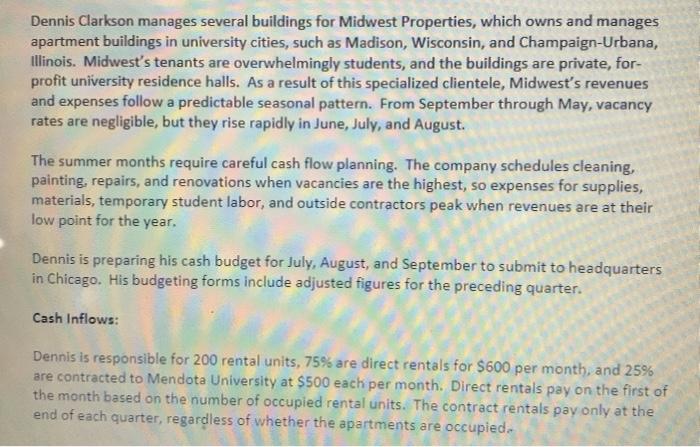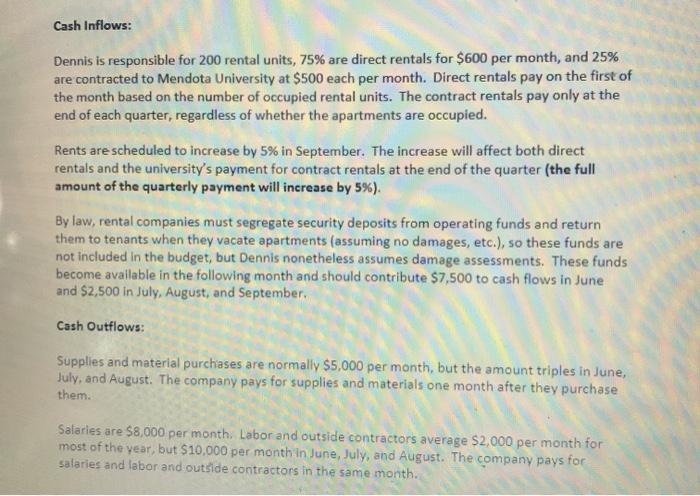Dennis Clarkson manages several buildings for Midwest Properties, which owns and manages apartment buildings in university cities, such as Madison, Wisconsin, and Champaign-Urbana, Illinois. Midwest's tenants are overwhelmingly students, and the buildings are private, for- profit university residence halls. As a result of this specialized clientele, Midwest's revenues and expenses follow a predictable seasonal pattern. From September through May, vacancy rates are negligible, but they rise rapidly in June, July, and August. The summer months require careful cash flow planning. The company schedules cleaning, painting, repairs, and renovations when vacancies are the highest, so expenses for supplies, materials, temporary student labor, and outside contractors peak when revenues are at their low point for the year. Dennis is preparing his cash budget for July, August, and September to submit to headquarters in Chicago. His budgeting forms include adjusted figures for the preceding quarter. Cash Inflows: Dennis is responsible for 200 rental units, 75% are direct rentals for $600 per month, and 25% are contracted to Mendota University at $500 each per month. Direct rentals pay on the first of the month based on the number of occupied rental units. The contract rentals pay only at the end of each quarter, regardless of whether the apartments are occupied Cash Inflows: Dennis is responsible for 200 rental units, 75% are direct rentals for $600 per month, and 25% are contracted to Mendota University at $500 each per month. Direct rentals pay on the first of the month based on the number of occupied rental units. The contract rentals pay only at the end of each quarter, regardless of whether the apartments are occupied. Rents are scheduled to increase by 5% in September. The increase will affect both direct rentals and the university's payment for contract rentals at the end of the quarter (the full amount of the quarterly payment will increase by 5%). By law, rental companies must segregate security deposits from operating funds and return them to tenants when they vacate apartments (assuming no damages, etc.), so these funds are not included in the budget, but Dennis nonetheless assumes damage assessments. These funds become available in the following month and should contribute $7,500 to cash flows in June and $2,500 in July, August, and September Cash Outflows: Supplies and material purchases are normally $5,000 per month, but the amount triples in June, July, and August. The company pays for supplies and materials one month after they purchase them. Salaries are $8,000 per month Labor and outside contractors average $2,000 per month for most of the year, but $10,000 per month in June, July, and August. The company pays for salaries and labor and outside contractors in the same month. Utilities average $80 per occupied apartment. The company pays utilities in the following month. Payments of $150,000 on debt, $31,500 for property taxes, and $15,500 for insurance are paid in the last month of each quarter. Instructions: Complete the Cash Budget for July, August, and September









